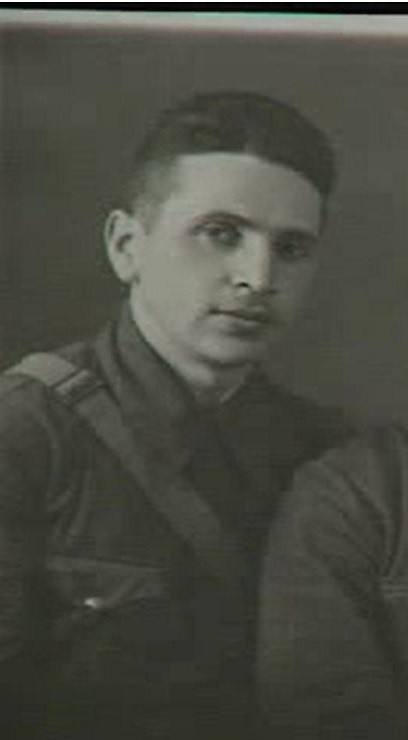Abram Khomutetskii was born in 1913 in Kiev. His father Khaim (Efim) worked at a sewing factory. The family was traditional and Yiddish-speaking. For about two or three years, little Abram attended a cheder, after which he was sent to a standard Ukrainian-language Soviet school. In 1930, upon finishing seven classes of school, Abram entered the Kiev electrical technikum (technical college), which he finished in 1933. He went on to work in electrical engineering. In the years 1935-37, he served in the Red Army as an artilleryman, eventually becoming deputy commander of a technical platoon. In 1941, shortly before the German invasion of the Soviet Union, he was promoted to military technician, 2nd rank, which was equivalent to the rank of lieutenant.
On June 22, 1941, the Soviet-German War broke out, and on July 11 Khomutetskii was drafted into active service; he was attached to the 68th Separate Communications Regiment of the 37th Army, which was being formed in Kharkiv, eastern Ukraine. Over the following year, from July 1941 to July 1942, Khomutetskii served with various rear technical units, taking part in the Battle of Kharkiv in October 1941-May 1942. In July 1942, during the summer retreat of the Red Army in the south, Khomutetskii, as the commander of a rifle company, was dispatched to the front lines to halt the advance of an enemy tank column. The company failed to carry out their task; Khomutetskii's soldiers abandoned their commander, and he found himself in the rear of the Hungarian Army. Khomutetskii decided to head north, intending to leave the steppe for the forest and try to find Soviet partisans. Because of his markedly Jewish appearance, he had to be cautious – but, according to him, the Hungarians were not as keen on hunting for Jews as the Germans.1 In early October 1942, Khomutetskii joined a partisan unit (which would later become part of the Suvorov Partisan Brigade), and was even appointed commander of a technical platoon. In this capacity, he took part in the so-called "rail war" – disrupting the railway communications of the German Army, derailing enemy trains, etc. Khomutetskii finished his service with the partisans as deputy political commissar of the brigade.
In October 1943, the Suvorov Brigade met the Red Army. Khomutetskii's new job was assigning the former partisans to various units of the regular army. Having finished this task, he was given the choice: either to continue his frontline service, or be sent to an administrative post. He chose the latter option and went to the Soviet Republic of Kirgizia (present-day Kyrgyzstan), where his family had been evacuated.
Abram Khomutetskii returned to Kiev in 1946. Although he was recommended for military awards during the war, his only decorations were several medals received in the postwar period.
- 1. YVA O.93/49720]







